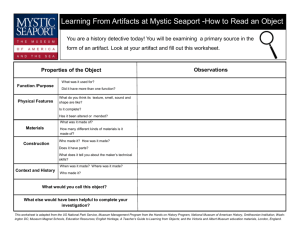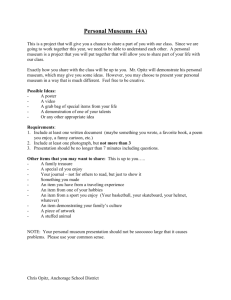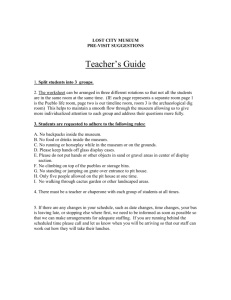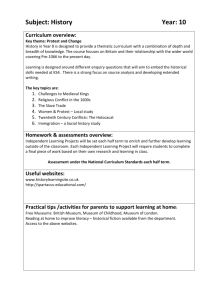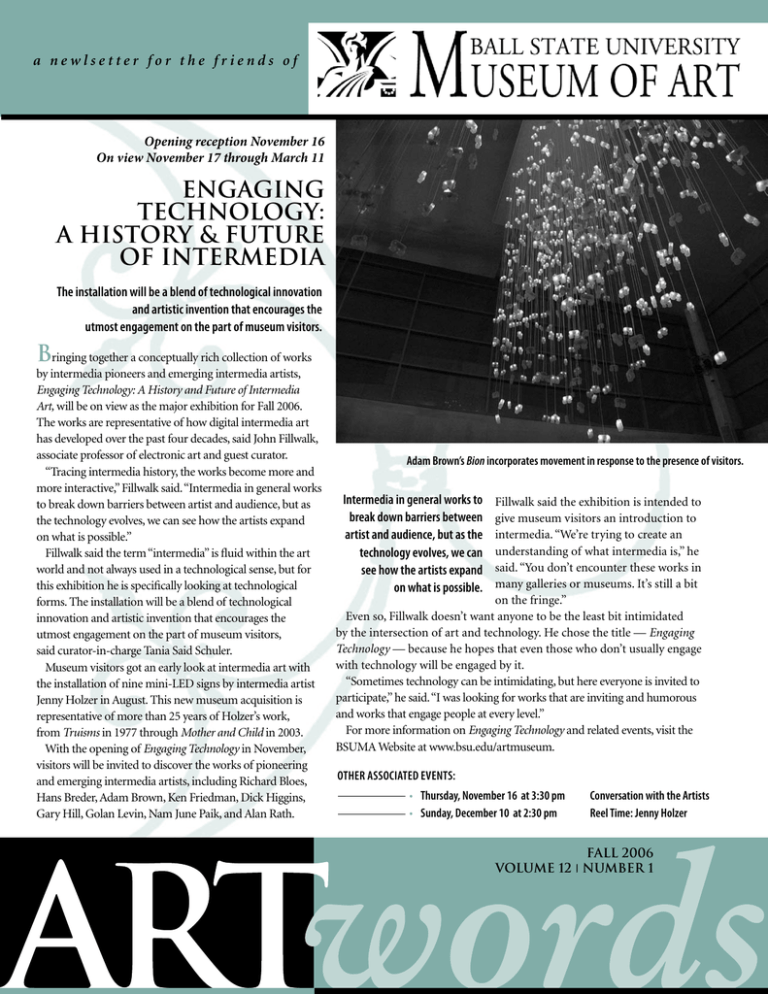
a newlsetter for the friends of
Opening reception November 16
On view November 17 through March 11
Engaging
Technology:
A History & Future
of Intermedia
The installation will be a blend of technological innovation
and artistic invention that encourages the
utmost engagement on the part of museum visitors.
Bringing together a conceptually rich collection of works
by intermedia pioneers and emerging intermedia artists,
Engaging Technology: A History and Future of Intermedia
Art, will be on view as the major exhibition for Fall 2006.
The works are representative of how digital intermedia art
has developed over the past four decades, said John Fillwalk,
associate professor of electronic art and guest curator.
“Tracing intermedia history, the works become more and
more interactive,” Fillwalk said. “Intermedia in general works
to break down barriers between artist and audience, but as
the technology evolves, we can see how the artists expand
on what is possible.”
Fillwalk said the term “intermedia” is fluid within the art
world and not always used in a technological sense, but for
this exhibition he is specifically looking at technological
forms. The installation will be a blend of technological
innovation and artistic invention that encourages the
utmost engagement on the part of museum visitors,
said curator-in-charge Tania Said Schuler.
Museum visitors got an early look at intermedia art with
the installation of nine mini-LED signs by intermedia artist
Jenny Holzer in August. This new museum acquisition is
representative of more than 25 years of Holzer’s work,
from Truisms in 1977 through Mother and Child in 2003.
With the opening of Engaging Technology in November,
visitors will be invited to discover the works of pioneering
and emerging intermedia artists, including Richard Bloes,
Hans Breder, Adam Brown, Ken Friedman, Dick Higgins,
Gary Hill, Golan Levin, Nam June Paik, and Alan Rath.
Adam Brown’s Bion incorporates movement in response to the presence of visitors.
Intermedia in general works to Fillwalk said the exhibition is intended to break down barriers between give museum visitors an introduction to artist and audience, but as the intermedia. “We’re trying to create an technology evolves, we can understanding of what intermedia is,” he see how the artists expand said. “You don’t encounter these works in on what is possible. many galleries or museums. It’s still a bit
on the fringe.”
Even so, Fillwalk doesn’t want anyone to be the least bit intimidated
by the intersection of art and technology. He chose the title — Engaging
Technology — because he hopes that even those who don’t usually engage
with technology will be engaged by it.
“Sometimes technology can be intimidating, but here everyone is invited to
participate,” he said. “I was looking for works that are inviting and humorous
and works that engage people at every level.”
For more information on Engaging Technology and related events, visit the
BSUMA Website at www.bsu.edu/artmuseum.
Other Associated Events:
• Thursday, November 16 at 3:30 pm
• Sunday, December 10 at 2:30 pm
Conversation with the Artists
Reel Time: Jenny Holzer
fall 2006
Volume 12 | Number 1
From the Director…
Awareness & access
define museum’s direction
This is the 70th anniversary of the Museum of Art’s
Ball State University Museum of Art
Serving East Central Indiana since 1936
Friends Executive Committee
Pam Morgan
Chairperson
Tiffany Arnold
David Dale
Genny Gordy
Gloria Griner
Sandra Kelly
Joan Malje
Olga Mounayar
Gordon Stagge
Judy Wagley
Ex officio
Peter F. Blume
Director, BSUMA
Ben Hancock
Vice President for
University Advancement
Terry King
Provost
Robert Kvam
Dean, College of Fine Arts
Judy Wagley
BSUMA Alliance President
BSUMA Staff
Peter Blume
Director
Carl Schafer
Associate Director
Tania Said Schuler
Curator of Education
ARTwords
Editor | Tania Said Schuler
Writer | Carmen Siering
Design | Marin & Marin
ARTwords is published
quarterly by the
Ball State University
Museum of Art
Muncie, IN
©2006. All rights reserved.
2
Access includes making
the content of the museum
available electronically.
We need to engage our visitors
where they live, and for anyone
under the age of 25, that means
accessing information online.
operation in this building. Although it was called the
Art Gallery when it opened, the physical plant remains
nearly unchanged. What might have seemed a bit too
grand for a gallery in 1936 is now about the right size
for the museum.
Three years ago the museum staff met to discuss the
most important goals for the coming years. The consensus
was there were two areas in which we wanted to focus
our energies: awareness and access. We have built our
annual operating plans around these two strategic issues.
One of the goals was to make the content of the museum
available electronically. The response was DIDO (Digital
Imaging Delivered Online), a project that got rolling
with a small internal grant from the Enhanced Provost
Initiative. For the pilot project we began to photograph,
catalog, and enable electronic access to works in the
museum collection.
Now we are ready to begin a much larger project,
one that will develop a user-friendly database of the more
than 11,000 works of art in the museum collection.
This database will be online and can be digitally accessed
by museum “visitors” from around the world. A portion
of the database will interface with the Ball State University
Libraries Digital Media Repository, allowing keyword
searches that will bring up images from the museum
collection when researchers type in even general terms
such as “saints,” “flowers,” or even “chairs.” The museum
has been awarded a very generous grant of $145,835 from
the Institute of Museum and Library Services (IMLS) to
continue this project. Even the humanities can use a boost
from new technologies.
Our major exhibition this autumn is plugged in, too.
Engaging Technology as a title is a deliberate play on
words. In one sense the title reflects the embracing of new
technologies. At the same time, each of the works is itself
engaging — even though electronically driven, each work
offers a completely human element as well. You might say
the museum is electrifying. Do not miss it.
Peter F. Blume
art alliance
celebrates 25th anniversary
the summer of 2006 marked the 25
anniversary of the Ball State University Museum of Art Alliance.
Founded as a special sub-group of the Friends of the Museum, long-time Alliance member Gloria Griner
said the focus hasn’t changed over the years.
“We have always been focused on finding ways to support the museum,” she said. The group meets
monthly to hear a lecture and share a luncheon. Funds are raised through annual dues and fees paid
for the monthly luncheon meetings. Monies raised finance the Art Alliance Fund.
Current Alliance president Judy Wagley said the executive committee is starting off the year with a
focus on increasing membership.
“We want to make attending our programs as accessible as possible,” she said. Wagley said getting
younger members to attend the monthly luncheon and program is a priority.
“Also, as president, I’m looking forward to working closely with the museum staff and Alliance
th
members to spread the word that the museum is open and available to the community at large.
We want to let people know there are programs available at the museum on a regular basis.”
The group began in the summer of 1981. Founding members of the Alliance were Ina Mohlman,
President; Frances Petty Sargent, Vice President; and Judy Lawson, Second Vice President.
The funds collected by Alliance membership assists in the conservation of the museum’s collection,
said museum director Peter Blume. The group’s most recent gift was the acquisition of gilt frames
made by local craftsman Brian Gordy. The eight frames were purchased for the Reordering the
Universe exhibition. See the calendar for the fall Alliance programs. For more information on
the Alliance, visit www.bsu.edu/artmuseum/friendsallies/.
2006-2007 Alliance officers: Judy Wagley, President; Sandra Kelly, First Vice President for Programs; and Margaret Slauter,
Second Vice President for Publicity; see Domenic Puligo’s (1492 – 1527) Portrait of a Lady for the first time. Funds for its
conservation were made possible by the Ball State University Museum of Art Alliance.
3
3
CALENDAR of EVENTS
fall 2006
september
13 wednesday • 12:00 pm
october
3 tuesday • 12:00 pm
Alliance Luncheon & Program
Art High at Noon: Gold
Program: “Twenty-Five Years of Alliance
Contributions,” presented by Director Peter Blume.
$10 for Alliance members and guests
(To join: $15 Friends members, $40 non-members)
View and discuss Pre-Columbian pre-contact
gold pendants with a BSUMA docent.
19 tuesday • 12:00 pm
Art High at Noon: Visually Representing
View Vic Muniz’s Seville Orange, Silver Goblet,
Apples, Pear, and Two Bottles, After Chardin;
and Katherine Porter’s Chalantenango with
a BSUMA docent.
23friday
Light Painting on View
Featuring colored glass brightly lit, artist
Stephen Knapp’s Light Symphony, a mammoth
23 x 40-foot artwork, goes on view indefinitely
in the Music Instruction Building on the corner
of McKinley Avenue and Riverside Avenue.
24sunday • 2:30 pm
First Person: Director’s Highlights
Join Director Peter Blume for a tour of the favorites
he organized for Reordering the Universe: Recent
Acquisitions, and find out more about how the
Museum of Art acquires new collections.
In conjunction with Family Weekend 2006.
11
wednesday • 12:00 pm
Alliance Luncheon & Program
Program: “Why Museums Matter More—
A History of Their Birth and Life,”
presented by Associate Director Carl Schafer.
$10 for Alliance members and guests
(To join: $15 Friends members, $40 non-members)
13 friday • 5:00 pm
Petty Memorial Lecture
Maxwell Anderson, Director and CEO,
Indianapolis Museum of Art.
Cocktails and dinner follow. Call the Museum
of Art for more information, including cost.
17 tuesday • 12:00 pm
Art High at Noon: Childe Hassam
View Bowl of Goldfish and The Old Lyme Bridge
with a BSUMA docent.
22sunday • 2:30 pm
First Person: Fish and Feathered Friends
Tour Creatures of the Sea and Sky with
Tania Said Schuler, Curator of Education,
and learn about the exhibition organized by
former Associate Director Ruta T. Salikilis
27 friday • 4:00 pm
Annual Halloween Bash
The Ball State University Museum of Art
puts on its scariest face for a real monster
mash with a costume contest, music, food, and
“kreepy kids krafts.” All ages from the campus,
community, and beyond are welcome.
29-31 sunday-tuesday
Fall Break
Museum keeps regular hours.
4
CALENDAR of EVENTS
fall 2006
november
5 sunday
december
1 friday • 12:00 pm
Exhibitions closing:
Reel Time: Sea in the Blood
Creatures of the Sea and Sky
Reordering the Universe: Recent Acquisitions
View Richard Furg’s personal documentary
about the impact of AIDS on his life.
In collaboration with the BSU Health Center,
and Day with(out) Art.
8
wednesday • 12:00 pm
Alliance Luncheon & Program
Program: “Expanding the Traditional Boundaries
of Art and Museums,” presented by Tuliza Fleming,
independent scholar and curator & formerly
Associate Curator, Dayton Art Institute.
$10 for Alliance members and guests
(To join: $15 Friends members, $40 non-members)
12 sunday • 12:00 pm
Expert Art: Illustrated Philosophy
Join Department of Philosophy and Religious Studies
Chairperson Dr. Julie Eflin for a high-speed tour of
philosophy as seen through art of the last 4,000 years.
14tuesday • 12:00 pm
Art High at Noon
View Plains Indians pipes and vests with
a BSUMA docent
16 thursday
1
friday • 5:00 - 7:00 pm
Friday with Friends:
German Christmas Traditions
Enjoy German culture by learning about
its Christmas traditions as presented by
Thomas B. Schwartz, taking a self-guided tour
of art on view by German artists, and tasting
the country’s culinary delights. In conjunction
with Muncie neighborhood associations.
10sunday • 2:30 pm
Reel Time: Jenny Holzer
A selection of film segments featuring
artist Jenny Holzer, her work, and her
times in conjunction with her work in
the Brown Study Room.
13 wednesday • 12:00 pm
Alliance Luncheon & Program
Engaging Technology:
A History and Future of Intermedia Art
In association with the Muncie Young
Professionals Group.
Program: “Ball State’s Digital Media Repository:
An Asset for Learning, Teaching, and Research,”
presented by Dr. John Straw, Director, Archives
and Special Collections Research Center,
BSU Libraries
$10 for Alliance members and guests
(To join: $15 Friends members, $40 non-members)
23-24 thursday-friday
Holiday break
Conversation with the Artists • 3:30 pm
Exhibition opening • 4:30 pm
Museum closes.
Christmas Break - Museum closed December 22
(starting at 3:00 pm) and December 25 and 26.
28tuesday • 12:00 pm
New Year’s Holiday - Museum closed December
29 (starting at 3:00 pm) and January 1 and 2.
Thanksgiving Break
Art High at Noon
View Southwestern Indians’ pottery and baskets
with a BSUMA docent.
5
Carl Schafer Joins Museum Staff
The museum says goodbye to outgoing associate director Ruta Saliklis
and welcomes Carl Schafer as he begins his tenure in that position
For a university, the new year begins
6
6
not in the cold of January but with
the crush of late summer heat and
humidity. It is at this time of year that
the comings and goings of faculty and
staff take place, and so the museum
says goodbye to outgoing associate
director Ruta Saliklis and welcomes
Carl Schafer as he begins his tenure
in that position.
Saliklis, who became a part of
the museum staff in 2004, will
join her husband, Ed, in San Luis
Obispo, California. Ed Saliklis is an
assistant professor of architectural
engineering at California Polytechnic
State University.
“I’ll be hiking, biking, and maybe
even surfing until I get serious and
start working full-time again,”
Saliklis said.
Shafer comes to Ball State after
serving as registrar at Allentown Art Museum, Allentown, Pennsylvania. An Indiana native, Schafer grew
up in Madison, received his bachelor’s degree from Hanover College and earned a master’s in art history
from Syracuse University. The move to Muncie was made for reasons both professional and personal,
Schafer said.
“Professionally, this position offers a wonderful challenge,” he said. “I’m very interested in collection
management and accessibility.”
Schafer is referring to DIDO (Digital Imaging Delivered Online), the ambitious project the museum
began last year to photograph, catalog, and ultimately enable electronic access via the Internet to its
more than 11,000 works of art. Museum director Peter Blume worked on a similar project with
Schafer when Blume served as director of the Allentown Art Museum.
“I’m delighted that we will be working together again,” Blume said. “This is a major project, one
we will be working on for the next five or six years. And since we have worked together before, we
won’t have to reinvent the wheel.” Taking the museum’s collection into the digital age is the next
step in making the museum more accessible.
Schafer said it’s common that museums only have a small percentage of their collection on view.
“So this is a very important aspect of museum work. It’s a way for museums to allow their collections
to be seen even when most of the collection is physically in storage because of limited space.”
On a more personal level, Schafer said coming home to Indiana will allow him and his wife,
Barbara, whose parents also reside in the state, to spend more time with their extended families.
With five-year-old son George and newborn daughter Hannah, moving closer to the grandparents
seems like a good idea.
“I’m very excited to be joining the museum. It offers a lot of professional opportunities and
personally it comes at a good time,” Schafer said. “It’s really the perfect job for me.”
On view through November 5, 2006
Special Exhibitions Closing This Fall
From elementary age students through college, the exhibitions offer a view
of the world few will see through a television screen or computer monitor.
Two special exhibitions that have enjoyed enthusiastic response from museum visitors over the
summer months and into the fall will soon become only a memory. Reordering the Universe: Recent
Acquisitions, a miscellany of works that have become part of the BSUMA collection since Peter Blume
became director in 2003, and Creatures of the Sea and Sky, an exhibition focusing on the masters
of the airy heights and ocean depths, will be closing Sunday, November 5, 2006.
The exhibitions have been especially popular with area educators, who find them to be
applicable to a variety of subjects within any number of disciplines.
Associate professor Sue Whitaker
said the capstone course she teaches in
Family and Consumer Science is taken
by students with a variety of majors, but
taking the students to the museum is
valuable for each of them as they
prepare for life after graduation.
“The museum staff explains the
purpose of museums within the
community and makes students
aware of how, as a community resource,
museums can be a part of their
professional careers,” Whitaker said.
The exhibitions have
been especially popular with
area educators, who find them
to be applicable to a variety
of subjects within any
number of disciplines.
For other educators, the exhibitions
offer ways of seeing and learning that
go beyond the everyday. From
elementary age students through
college, the exhibitions offer a view
of the world few will see through a
television screen or computer monitor.
“For my students, it is an inspiration,
even if they have never been to a
museum before,” Whitaker said.
“It’s a valuable educational resource
in our community that any educator
can utilize.”
For a feel of the sea and to appreciate deluxe artifacts,
see Lobster Creel with Lid, designed by Sally Tuffin Dennis, 1993,
in Reordering the Universe: Recent Acquisitions.
7
7
fall 2006
volume 12 | number 1
museum hours
monday-friday
9:00 am-4:30 pm
saturday and sunday
1:30 pm-4:30 pm
765.285.5242
Celebrating 70 years 1936 - 2006
ball state university
muncie, in 47306
www.bsu.edu/artmuseum
in this ISSUE
Introducing Intermedia
In this issue, you will be introduced to intermedia.
You might think of it as blend of technology and
artistry that engages the viewer by breaking down
the barriers between art, artist, and audience.
But to really understand intermedia, visit
Engaging Technology: A History and Future of Intermedia,
November 17 through March 11.
PLUS…
Notes From the Director, our Calendar of Events,
and so much more. All inside this issue of ARTwords!
New in the Galleries
At first glance, it is easy to conclude Mark DiSuvero’s welded steel
sculpture Degas Dancer has been mightily misnamed.
Upon further inspection, and with a little reflection on the way
nineteenth-century French artist Edgar Degas’ presented his ballet
dancers, the connection becomes a little less abstract.
Like Degas’ dancers, DiSuvero’s sculpture is a work of artful wonder
that emphasizes the beauty of balance as well as that of grace. Degas
Dancer is a study in disparate forms that seem to defy gravity as an
enormous superstructure balances on the point of a support pier.
Next time you visit, go to the North Gallery, Bay 5, on the west side,
to see Degas Dancer, in person. You will enjoy the dance!
Degas Dancer • Mark DiSuvero • 1980
Lent by David T. Owsley in honor of Peter F. Blume
Submit your ideas by March 1
for the Museum of Art’s New Slogan!
In the spring issue, a short list will be provided for the public’s vote.
Submit your idea through our homepage by visiting the “Help the BSUMA Create
a New Slogan” link or by mailing your submission to artmuseum@bsu.edu or the
BSU Museum of Art, Attention: Slogan, Ball State University, Muncie, IN 47306.
We want to hear from you!



